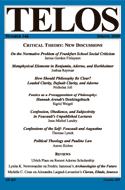As an occasional feature on TELOSscope, we highlight a past Telos article whose critical insights continue to illuminate our thinking and challenge our assumptions. Today, Charles Kollmer looks at Nicholas Joll’s “How Should Philosophy Be Clear? Loaded Clarity, Default Clarity, and Adorno,” from Telos 146 (Spring 2009).
 In an apropos piece of metaphilosophy entitled “How Should Philosophy Be Clear?” Nicholas Joll offers several insights on the concept of clarity in relation to philosophical texts. On initial inspection, Joll’s style seems to reveal a bias towards the Analytical tradition in philosophy: his argumentation is clearly organized, rigorous, and formulated in logical propositions. Yet his work also attains the savvy and self-awareness that renders metaphilosophy convincing, as demonstrated in his first proposition, which states that any notion of clarity will be partisan with regards to the Analytical-Continental divide. In spite of this partisanship, Joll champions a concept of “default clarity” and demonstrates its aptitude for judiciously evaluating argumentation. He shrewdly refuses to overdetermine the prescriptive force of default clarity. Far from an immutable law, default clarity offers broad guidelines with the caveat that “the justificatory burden lies with those who would eschew such clarity.”
In an apropos piece of metaphilosophy entitled “How Should Philosophy Be Clear?” Nicholas Joll offers several insights on the concept of clarity in relation to philosophical texts. On initial inspection, Joll’s style seems to reveal a bias towards the Analytical tradition in philosophy: his argumentation is clearly organized, rigorous, and formulated in logical propositions. Yet his work also attains the savvy and self-awareness that renders metaphilosophy convincing, as demonstrated in his first proposition, which states that any notion of clarity will be partisan with regards to the Analytical-Continental divide. In spite of this partisanship, Joll champions a concept of “default clarity” and demonstrates its aptitude for judiciously evaluating argumentation. He shrewdly refuses to overdetermine the prescriptive force of default clarity. Far from an immutable law, default clarity offers broad guidelines with the caveat that “the justificatory burden lies with those who would eschew such clarity.”







